MercoPress. South Atlantic News Agency
Tag: Argentine economy
-
Wednesday, April 5th 2017 - 06:32 UTC
S&P raised Argentina's credit rating to “B”, on the “verge of exiting recession”

Standard & Poor's raised Argentina's credit rating one notch Tuesday, from B- to B, saying Latin America's third-largest economy was on the verge of exiting recession.The rating bump gives a boost to conservative President Mauricio Macri, who has launched sweeping - often unpopular - economic reforms aimed at reviving growth.
-
Wednesday, March 29th 2017 - 10:37 UTC
Argentine minister confident agriculture and public works will boost the economy
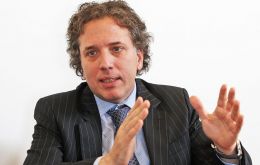
Argentine Finance minister Nicolas Dujovne said on Tuesday that the economy's recovery at the start of the year was based on investment and not in consumption. “It is a heterogeneous recovery, with performance in different sectors: government social expenditure was up 70% but manufacturing was down 80%, mainly because of the Brazilian recession, and domestic contraction”, admitted the minister.
-
Wednesday, March 29th 2017 - 10:25 UTC
Argentina's economic activity up 1.1% year to year in January
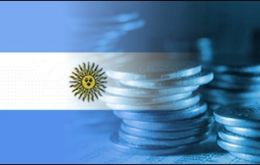
Argentina's economic activity grew in January year to year. Economic activity was 1.1% percent higher in January than twelve months before, the first year-on-year growth since last March, according to the latest release from the revamped stats office, Indec.
-
Wednesday, March 22nd 2017 - 12:20 UTC
Relief for Macri: stats confirm the economy is moving out of recession

Argentina's economy exited a prolonged recession in the second half of last year, with government data on Tuesday showing a 0.5% expansion in the fourth quarter of 2016 compared with the third quarter. Indec stats agency also revised its estimate for third-quarter GDP to a 0.1% increase over the second quarter, up from a 0.2% decline previously. Taken together, the data show Argentina's economy grew in the second half after shrinking for three straight quarters.
-
Sunday, February 26th 2017 - 11:29 UTC
Argentine economy finally seems to have began a rebound
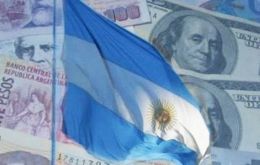
Argentina's economic activity rose 1.6% in December compared with the previous month, government data showed, a sign the economy likely expanded in the fourth quarter after a long recession. The economy fell 0.1% in December year over year and closed 2016 down 2.3% compared with 2015.
-
Monday, January 2nd 2017 - 05:45 UTC
Argentina's new economic team aims to fight budget deficit and reform the tax code
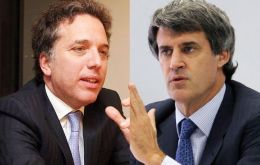
In his first public comments since his appointment, Argentine Economy minister Nicolas Dujovne told a press conference that his main objective would be to continue with center-right President Mauricio Macri's economic policies.
-
Tuesday, November 29th 2016 - 08:21 UTC
OECD optimistic about global growth; anticipates strong performance of Argentine economy next year
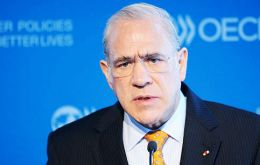
Fiscal initiatives could boost global economic growth, the Organization for Economic Cooperation and Development (OECD) said Monday in its semi-annual economic forecast. The Paris-based think tank predicted a global gross domestic product (GPD) growth rate of 3.3% in 2017, a figure that remained unchanged from its last outlook released in June.
-
Monday, November 21st 2016 - 11:22 UTC
Nobody is going to invest in Argentina while fearing populism could be round the corner
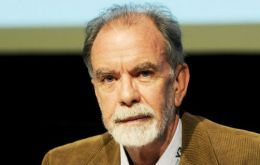
Even admitting that the Argentine economy will expand 3% next year, nobody wants to invest in the country because they are not sure that populism won't be back in a couple of years, according to economist and former central bank chair Javier Gonzalez Fraga.
-
Friday, September 23rd 2016 - 09:32 UTC
Argentina's economy further contracts in 2Q; government insists recovery is round the corner
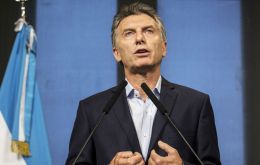
Argentina’s recession deepened in the second quarter as President Mauricio Macri’s efforts to implement free-market reform exacerbated an already flagging economy. GDP fell 3.4% from the same period a year earlier, the largest year-on-year contraction in almost two years, the refurbished statistics agency said in a report published on Thursday.
-
Monday, August 29th 2016 - 03:59 UTC
Court ruling and economy contraction push Argentine inflation down in August

Inflation in Argentina during the current month of August could drop to 0.7% because of the Supreme Court’s decision to strike down the hikes in natural gas prices for residential users, according to the official stats office Indec. Similar stats also indicate a strong contraction of the Argentine economy.
